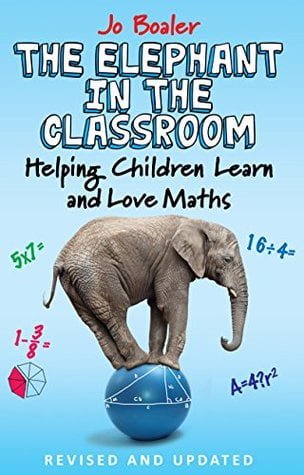Despite having an enquiring and inquisitive mind I hated Maths at secondary school. If there was something available that helped others who felt as I used to do, then I wanted to know about it and to share it. The Elephant in the Classroom is that ‘something.’

Why do millions struggle with mathematics and what can be done to change that for the next generation?
Jo Boaler outlines what has gone wrong in mathematics education, identifying the problems facing children in classrooms today. How can children be prepared for the mathematics they will need in the future? They need to be taught to be quantitatively literate, to think flexibly and creatively and how to problem solve.
Jo Boaler offers concrete solutions for parents and teachers that will revolutionise children’s experiences with maths. Drawing on Jo Boaler’s work with Carol Dweck, demonstrating how teachers and parents can give children a growth mindset, while investigating changes to the National Curriculum, The Elephant in the Classroom shows where we are in mathematics education. Along with practical teaching activities, strategies and questions that can transform a child s mathematical future Jo Boaler shares a range of free and accessible online resources.
This is an exciting way forward, an indispensable guide and resource for parents, teachers and educationalists, which inspires and enthuses as much as it teaches.
Jera’s Jamboree receives payments for affiliate advertising. This is at no extra cost to you. As an Amazon Associate I earn from qualifying purchases. As a Cratejoy affiliate I earn if you click on a link and shop from my link. Please see my disclosure policy for more information.
The Elephant in the Classroom by Jo Boaler is published by Souvenir Press Ltd and is available to purchase in digital and paperback formats.
The Elephant in the Classroom Review
Confession – I hated Maths so much that I was disruptive and was kicked out of lessons. Of course not something I’m proud of. No-one had the time to find out what was driving my behaviours and it wasn’t until I started working in a Primary school that everything finally clicked. In fact I developed such a love of Maths that I became the Maths specialist and felt confident to sit the test for Adult Numeracy Level 2 which is equivalent to GCSE (and yes, I passed).
Teaching Booster Maths a few years ago, the thing I heard the most was
‘I’m stupid and rubbish and I can’t do Maths.’
Straight away there’s a barrier. Mindset.
Jo Boaler has worked extensively with Mindset proponent Carol Dweck. Carol’s decades of research with people of various ages shows that a people with a growth mindset (who believe that intelligence and smartness can be learned) go on to higher levels of achievement. (As an aside, we use mindset sessions in our inclusion work with vulnerable children – there are some fabulous resources available free for teachers and parents).
It’s a perpetuated myth that some people are naturally good at Maths and some are not. One of my favourite Zen quotes is:
Don’t believe everything you think.
Jo Boaler is passionate about sharing the important message that Maths can be learned to high levels by ANY child – that there is no such thing as a ‘maths gift’ and that the right teaching and parenting can inspire all.
It’s backed by up-to-date scientific evidence that the brain has incredible potential – for the brain to change and grow.
And that’s the thing I found most fascinating to learn in The Elephant in the Classroom.
Scientific evidence proves that when a mistake is made in Maths, the brain grows – synapses fire and connections are made. Even if we don’t know we’ve made a mistake, it’s the challenge that causes the process.
At the school I work in we’ve always said it’s good to make mistakes, that children shouldn’t feel humiliated, that’s the way we learn. The research reinforces the message that we want children to make mistakes. They’re not learning failures but learning achievements.
Jo says “There is a huge gap between what we know works for children and what happens in most classrooms.” With the removal of statutory requirement for assessment based on National Curriculum levels, having to ‘perform’ has been taken away. I believe that the introduction of ‘Mastery’ will allow the way Maths is taught to change. This could be a very exciting time.
Jo Boaler is dedicated to getting research to teachers and parents in an accessible way and she has created interactive online free courses at YouCubed.
The following video (from YouCubed) is fabulous for showing the different ways we all think:
Jo Teaching A Dot Card NumberTalk from YouCubed on Vimeo.

The Chapter headings in The Elephant and the Castle give an idea of what you’ll find:
- What is maths? And why do we all need it?
- What’s going wrong in classrooms? Identifying the problems
- A vision for a better future Effective classroom approaches
- Banishing the monsters Moving to more effective forms of assessment
- Making ‘low ability’ children How different forms of grouping can make or break children
- Paying the price for sugar and spice? How girls and women are kept out of maths and science
- Talking with numbers Key strategies and ways of working
- Giving children the best mathematical start in life Activities and advice for parents
- Moving to a more positive future
Jo Boaler has been on an incredible journey:
- Moving from Sussex to become a Professor at Stanford University
- Co-founder of YouCubed
- Presented new evidence on Maths and Mindset to the White House and to the BBC
- Shared ideas with over 130,000 people in free online interactive courses
I have no hesitation in recommending The Elephant in the Classroom to parents and teachers. This should be the next book you’re reading.
Twitter @joboaler